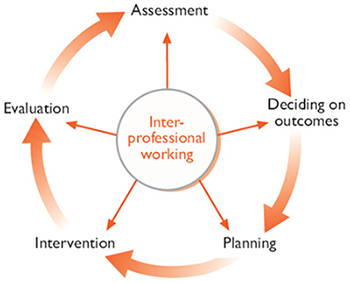1.3 The social work process
The social work process comprises a sequence of actions or tasks that draw on all of the components of practice discussed so far. Although its process is presented sequentially, it rarely follows a clear linear route and is more often a fluid, circular cycle whereby workers move from assessment through to implementation and evaluation and back to assessment again. Despite this fluidity, some parts of the process, such as assessment, have clearly defined procedures guided by law and local or national policy. Some tasks may be short and discrete, but many are longer term and more complex, such as assessments. You will also find that tasks often overlap and are revisited over a period of involvement with a service user. The tasks or stages of the social work process are shown in Figure 2 below.
Developing an understanding and awareness of the social work process is one of the prerequisites for becoming a ‘reflective’ practitioner. Reflection refers to the ability to work in a thoughtful and systematic way. Practitioners need to be aware (and inform service users) of why they are engaged in particular tasks and to be able to justify their methods of working. Interventions should be meaningful and fit within an overall plan or strategy. Awareness of the different stages of the social work process can assist social workers to prepare for, carry out and evaluate their interventions in order to both be accountable for, and reflect on, their actions.
It is important that we consider the legal and policy context of social work. We must consider the implementation and interpretation of law, legislation specific to social work practice as applicable to our own national region. It is important that we understand our powers and duties and the supporting frameworks for implementing law, e.g. statutory guidance, legal documents etc. We must also understand the implications of non-compliance.

